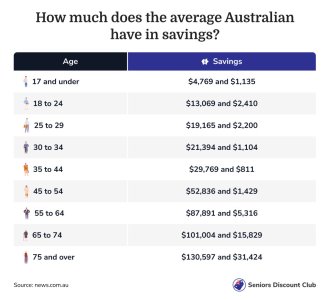Are you on track? See the average savings balances across Australian age groups
By
Maan
- Replies 40
Talking about money has always been a bit of a taboo subject, especially when it comes to savings.
Many Australians are left wondering if their savings are on track, or if they’re falling behind.
But what does the average Aussie really have in their bank account, and how can you know where you stand?
The topic of how much money you should have saved can be tricky to navigate, and the constant question remains: what’s considered a ‘good’ amount?
While some Aussies have started sharing their financial realities, confusion still surrounds what a healthy savings balance looks like.
Westpac provided a snapshot of their customers' average savings balances, offering some clarity.
For example, those aged 30 to 34 had an average balance of $21,394, but the median was only $1,104.
Westpac explained that the median is a better representation of the data than the average because it isn't influenced by extreme figures.
In fact, the average can sometimes be misleading if there are large outliers at either end.
The figures varied dramatically with age, as Australians’ savings evolve with different life milestones, such as purchasing property or saving for retirement.
Westpac shared the following breakdown of savings by age.
However, the cost-of-living crisis has significantly impacted many Australians’ savings.
Finder’s Consumer Sentiment tracker revealed that nearly 40 per cent of Aussies had less than $1,000 saved in April.
This national survey of over 60,000 respondents found the average Australian had $33,345 in cash savings.
Men had an average of $42,496, while women had $23,084.
Baby Boomers had $48,374 in savings on average, followed by Gen X with $39,065, Gen Y at $26,008, and Gen Z at $13,218.
Despite these numbers, money worries were on the rise, with 77 per cent of respondents stressed about their financial situation.
Financial experts recommend aiming for a solid emergency fund to weather unexpected situations like car repairs or vet bills.
Findex financial adviser Jess Bell suggested having three months' worth of income saved up for emergencies.
‘If you had around three months' worth of income in a savings account or in an offset account, I think that’s at least comfortable to provide for emergencies,’ she said.
She also emphasised that unexpected expenses can always arise, and it’s important to be prepared for those rainy days.
‘You need to make sure you have emergency funds to provide for those contingencies that just come out of the blue,’ she added.
‘It’s making sure that you allow for when things go wrong, because they can go wrong.’
In a previous story, we explored some bold money-saving strategies that Aussies have been using to stretch their budgets.
One mum shared her extreme tactics for avoiding retail prices at all costs.
Source: Youtube/TLC
If you're looking for more unconventional ways to save, be sure to check it out.

With so many Australians struggling to build their savings, how do you feel about your own financial situation? Share your thoughts in the comments below–we’d love to hear from you!
Many Australians are left wondering if their savings are on track, or if they’re falling behind.
But what does the average Aussie really have in their bank account, and how can you know where you stand?
The topic of how much money you should have saved can be tricky to navigate, and the constant question remains: what’s considered a ‘good’ amount?
While some Aussies have started sharing their financial realities, confusion still surrounds what a healthy savings balance looks like.
Westpac provided a snapshot of their customers' average savings balances, offering some clarity.
For example, those aged 30 to 34 had an average balance of $21,394, but the median was only $1,104.
Westpac explained that the median is a better representation of the data than the average because it isn't influenced by extreme figures.
In fact, the average can sometimes be misleading if there are large outliers at either end.
The figures varied dramatically with age, as Australians’ savings evolve with different life milestones, such as purchasing property or saving for retirement.
Westpac shared the following breakdown of savings by age.
However, the cost-of-living crisis has significantly impacted many Australians’ savings.
Finder’s Consumer Sentiment tracker revealed that nearly 40 per cent of Aussies had less than $1,000 saved in April.
This national survey of over 60,000 respondents found the average Australian had $33,345 in cash savings.
Men had an average of $42,496, while women had $23,084.
Baby Boomers had $48,374 in savings on average, followed by Gen X with $39,065, Gen Y at $26,008, and Gen Z at $13,218.
Despite these numbers, money worries were on the rise, with 77 per cent of respondents stressed about their financial situation.
Financial experts recommend aiming for a solid emergency fund to weather unexpected situations like car repairs or vet bills.
Findex financial adviser Jess Bell suggested having three months' worth of income saved up for emergencies.
‘If you had around three months' worth of income in a savings account or in an offset account, I think that’s at least comfortable to provide for emergencies,’ she said.
She also emphasised that unexpected expenses can always arise, and it’s important to be prepared for those rainy days.
‘You need to make sure you have emergency funds to provide for those contingencies that just come out of the blue,’ she added.
‘It’s making sure that you allow for when things go wrong, because they can go wrong.’
In a previous story, we explored some bold money-saving strategies that Aussies have been using to stretch their budgets.
One mum shared her extreme tactics for avoiding retail prices at all costs.
Source: Youtube/TLC
If you're looking for more unconventional ways to save, be sure to check it out.
Key Takeaways
- Talking about savings is often a taboo topic, leaving many Australians unsure of whether their savings are on track.
- Westpac’s data showed varying savings balances by age, with significant differences between the mean and median.
- The cost-of-living crisis has left nearly 40 per cent of Australians with less than $1,000 saved, with many feeling financially stressed.
- Experts recommend having at least three months' worth of income saved as an emergency fund to cover unexpected expenses.
With so many Australians struggling to build their savings, how do you feel about your own financial situation? Share your thoughts in the comments below–we’d love to hear from you!









